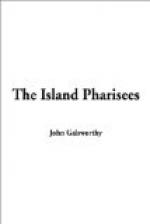He stood there, very straight, his eyes haunting his nephew’s face; there seemed to Shelton a touching muddle in his optimism—a muddle of tenderness and of intolerance, of truth and second-handedness. Like the lion above him, he seemed to be defying Life to make him look at her.
“No, my dear,” he said, handing sixpence to a sweeper; “feelings are snakes! only fit to be kept in bottles with tight corks. You won’t come to my club? Well, good-bye, old boy; my love to your mother when you see her”; and turning up the Square, he left Shelton to go on to his own club, feeling that he had parted, not from his uncle, but from the nation of which they were both members by birth and blood and education.
CHAPTER VII
THE CLUB
He went into the library of his club, and took up Burke’s Peerage. The words his uncle had said to him on hearing his engagement had been these: “Dennant! Are those the Holm Oaks Dennants? She was a Penguin.”
No one who knew Mr. Paramor connected him with snobbery, but there had been an “Ah! that ’s right; this is due to us” tone about the saying.
Shelton hunted for the name of Baltimore: “Charles Penguin, fifth Baron Baltimore. Issue: Alice, b. 184-, m. 186-Algernon Dennant, Esq., of Holm Oaks, Cross Eaton, Oxfordshire.” He put down the Peerage and took up the ‘Landed Gentry’: “Dennant, Algernon Cuffe, eldest son of the late Algernon Cuffe Dennant, Esq., J. P., and Irene, 2nd daur. of the Honble. Philip and Lady Lillian March Mallow; ed. Eton and Ch. Ch., Oxford, J. P. for Oxfordshire. Residence, Holm Oaks,” etc., etc. Dropping the ’Landed Gentry’, he took up a volume of the ‘Arabian Nights’, which some member had left reposing on the book-rest of his chair, but instead of reading he kept looking round the room. In almost every seat, reading or snoozing, were gentlemen who, in their own estimation, might have married Penguins. For the first time it struck him with what majestic leisureliness they turned the pages of their books, trifled with their teacups, or lightly snored. Yet no two were alike—a tall man-with dark moustache, thick hair, and red, smooth cheeks; another, bald, with stooping shoulders; a tremendous old buck, with a grey, pointed beard and large white waistcoat; a clean-shaven dapper man past middle age, whose face was like a bird’s; a long, sallow, misanthrope; and a sanguine creature fast asleep. Asleep or awake, reading or snoring, fat or thin, hairy or bald, the insulation of their red or pale faces was complete. They were all the creatures of good form. Staring at them or reading the Arabian Nights Shelton spent the time before dinner. He had not been long seated in the dining-room when a distant connection strolled up and took the next table.
“Ah, Shelton! Back? Somebody told me you were goin’ round the world.” He scrutinised the menu through his eyeglass. “Clear soup! . . . Read Jellaby’s speech? Amusing the way he squashes all those fellows. Best man in the House, he really is.”




